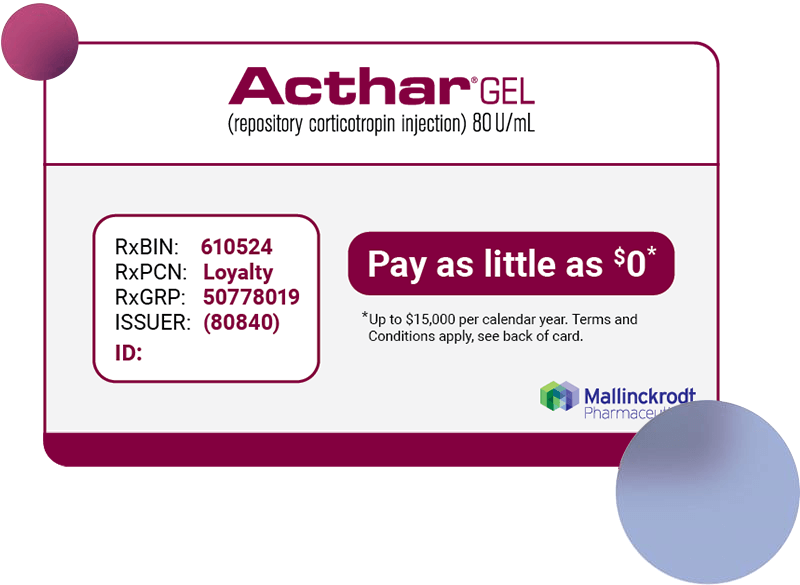IMPORTANT SAFETY
INFORMATION
DO NOT take Acthar until you have talked to your doctor if you have any of the following conditions:
- Have been given or are about to receive a live or live attenuated vaccine
- A skin condition called scleroderma
- Bone density loss or osteoporosis
- Any infections, including fungal, bacterial, or viral
- Eye infections, such as ocular herpes simplex
- Had recent surgery
- Stomach ulcers or a history of stomach ulcers
- Heart failure
- Uncontrolled high blood pressure
- Addison’s disease or Cushing’s syndrome
- Allergies to pig-derived proteins
- Suspected infections at birth (in infants under 2 years of age)
Tell your doctor about any other health problems that you have. Give your doctor a complete list of medicines you are taking, including all prescription and nonprescription medicines, vitamins, and herbal supplements.
What is the most important information I should know about
Acthar?
- Never inject Acthar directly into a vein
- Acthar is injected beneath the skin or into the muscle. Always inject Acthar with SelfJect beneath the skin
- Follow your doctor’s instructions for injecting Acthar
- Never stop treatment suddenly unless your doctor tells you to do so
- Try not to miss any scheduled doctor’s appointments. It is important for the doctor to monitor you while taking Acthar
- You may be more likely to get new infections. Also, old infections may become active. Tell your doctor if you see any signs of an infection. Contact your doctor at the first sign of an infection or fever. Signs of infection are fever, cough, vomiting, or diarrhea. Other signs may be flu or any open cuts or sores
- When taking Acthar long-term, your adrenal gland may produce too much of a hormone called cortisol. This can result in symptoms of Cushing’s syndrome. This may cause increased upper body fat, a rounded “moon” face, bruising easily, or muscle weakness
- Sometimes when you stop taking Acthar long-term, your body may not produce enough natural cortisol. This is called “adrenal insufficiency.” Your doctor may prescribe a steroid medicine to protect you until the adrenal gland recovers
- You might develop high blood pressure, retain too much salt and water, or have low blood potassium levels. As a result of this, your doctor may recommend some changes to your diet, such as eating less salt or taking certain supplements
- Vaccines may not work well when you are on Acthar. Talk to your doctor about which vaccines are safe to use when you are taking Acthar
- Acthar may hide symptoms of other diseases. This can make it more difficult for your doctor to make a diagnosis if something else is going on
- Stomach or intestinal problems. Acthar may increase the risk of bleeding and stomach ulcers. Tell your doctor if you have stomach pains, bloody vomit, bloody or black stools, excessive tiredness, increased thirst, difficulty breathing, or increased heart rate
- Taking Acthar can make you feel irritable or depressed. You may also have mood swings or trouble sleeping. These effects are reversible once Acthar therapy is stopped
- If you have other conditions, such as diabetes or muscle weakness, you may find they get worse
- You might develop certain eye conditions, such as cataracts, glaucoma, or optic nerve damage
- Your body may develop allergies to Acthar; these allergies may be severe. Signs of allergic reaction include:
- Skin rash and itching
- Swelling of the face, tongue, lips, or throat
- Trouble breathing
- The effects of Acthar may be intensified if you have an underactive thyroid or cirrhosis of the liver
- Long-term Acthar use can affect growth and physical development in children. This can be reversed when Acthar is no longer needed
- Acthar may cause osteoporosis (weak bones)
- Acthar might harm an unborn baby. Therefore, tell your doctor if you are pregnant or plan to become pregnant
What are the most common side effects of Acthar?
Commonly reported side effects of Acthar include:
- Injection site reaction
- Fatigue, physical weakness, and lack of energy
- Fluid retention
- Insomnia (difficulty sleeping)
- Headache
- High blood sugar
The most common side effects for the treatment of infantile spasms (IS) are:
- Increased risk of infections
- Convulsions
- High blood pressure
- Irritability
- Fever
The above side effects may also be seen in adults and children over 2 years of age. Some children with IS progress to other forms of seizures; IS sometimes masks these seizures, which may become visible after treatment for IS has been completed.
These are not all of the possible side effects of Acthar.
Tell your doctor about any side effect that bothers you, or that does not go away. Call your doctor or pharmacist for medical advice about side effects. You may report side effects to the FDA. Call 1-800-FDA-1088 1-800-FDA-1088 or visit www.fda.gov/medwatch. You may also report side effects by calling 1-800-844-28301-800-844-2830.
Please see full Prescribing Information. If you've been prescribed SelfJect, please see the 40‑unit or 80‑unit Instructions for Use and the 40‑unit or 80‑unit Quick Reference Guide.
For parents and caregivers of children with infantile spasms, please see the Medication Guide.





